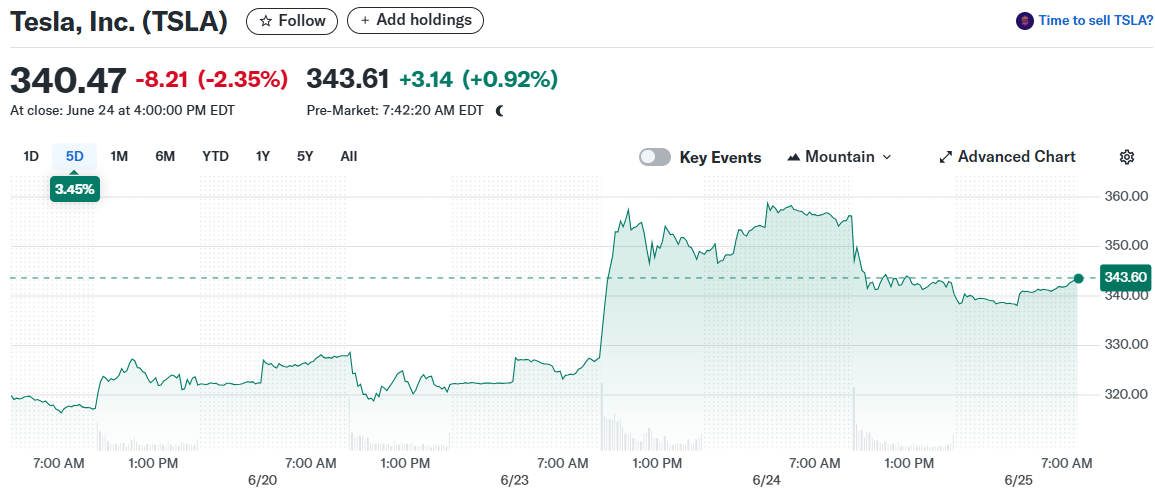TLDR
- Tesla’s European sales fell 27.9% in May, marking the fifth consecutive month of declines
- Market share dropped to 1.2% from 1.8% year-over-year as Chinese EV competitors gain ground
- Tesla launched robo-taxi service in Austin, Texas, charging $4.20 per ride in geofenced area
- Wall Street analysts remain divided on Tesla’s autonomous driving prospects despite stock gains
- Chinese automakers doubled their European market share to 5.9% while Tesla struggles
Tesla faces a tale of two markets as European sales continue their downward spiral while investors show cautious optimism about the company’s robo-taxi ambitions. The electric vehicle maker’s May performance in Europe painted a concerning picture of market share erosion.

New car sales in Europe dropped 27.9% compared to the same period last year. This marks the fifth straight month of declining sales for the Austin-based automaker. The company’s market share fell to just 1.2% from 1.8% a year earlier.
The decline comes as overall electric vehicle sales in Europe jumped 27.2%. Tesla’s struggles appear more pronounced when viewed against this backdrop of growing EV adoption across the continent.
Chinese manufacturers are capitalizing on Tesla’s weakness. They doubled their European market share to 5.9% in May, selling 65,808 vehicles despite EU tariffs on Chinese EVs. BYD registered nearly as many vehicles as Tesla in May after actually outselling Tesla in April.
Robo-Taxi Launch Generates Mixed Reactions
Tesla’s robo-taxi service launched in Austin, Texas on Sunday, offering rides for $4.20 in a geofenced area. The service ferried handpicked passengers as part of the company’s push into autonomous driving.
Wedbush analyst Dan Ives took two 15-minute rides and described the experience as “comfortable, safe, and personalized.” He believes the technology exceeded expectations and could spark broader autonomous driving adoption.
However, Goldman Sachs analyst Mark Delaney expressed surprise at the stock’s positive reaction. He noted that Tesla employees were present in the vehicles, suggesting the technology may not be as advanced as initially perceived.
The service’s limited scope has raised questions about scalability. Delaney expects the rollout to be slow and views the launch as just one step toward addressing the autonomous vehicle market.
Technical Modifications Raise Questions
GLJ Research analyst Gordon Johnson believes Tesla modified its Model Y vehicles with additional camera features and communications equipment. These modifications could complicate CEO Elon Musk’s vision of creating an Airbnb-style fleet from existing Tesla vehicles.
New Tesla Model Y in Pearl Beige pic.twitter.com/sKbUsLIXuy
— Tesla Newswire (@TeslaNewswire) June 24, 2025
RBC analyst Tom Narayan noted that passenger safety monitoring and remote backups are standard features in Level 4 autonomous services. He described investor feedback as “mostly neutral” despite the initial stock movement.
The stock gained about $18, or 6%, for the week leading up to Tuesday trading. This performance suggests investors remain cautiously optimistic about Tesla’s autonomous driving prospects.
Analyst price targets reflect the uncertainty surrounding Tesla’s future. Targets range from below $50 to $500 per share, highlighting the wide range of opinions on the company’s valuation.
European market data shows broader trends working against Tesla. Chinese state-owned SAIC Motor saw registrations rise 22.5% while BMW gained 5.6%. Tesla’s revised Model Y has yet to reverse the company’s declining fortunes in the region.
The European Union’s electric vehicle market continues expanding despite Tesla’s struggles. Battery-electric, plug-in hybrid, and hybrid-electric vehicles combined accounted for 58.9% of passenger car registrations in May, up from 48.9% a year earlier.
Tesla’s challenges in Europe reflect broader competitive pressures as traditional automakers and Chinese rivals accelerate their EV launches. The company’s ability to maintain market position depends on successfully executing its autonomous driving strategy while addressing regional sales declines.
The robo-taxi service represents Tesla’s latest attempt to differentiate itself through technology rather than traditional automotive metrics. Early investor reaction suggests the market remains willing to bet on Tesla’s long-term autonomous driving vision despite near-term operational challenges.






